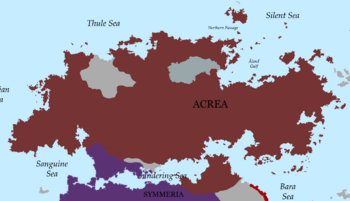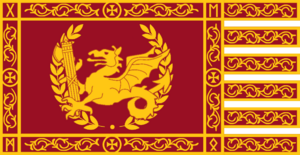Acrean Empire
Acrean Empire Norðreyjar Norðurkeisarreyjar Caesarregnum Aquilonaris | |
|---|---|
| 284 BCE–1016 CEa 1330 CEb | |
 The Acrean Empire at its greatest extent, ca. 550 CE | |
| Capital | Rena |
| Common languages | Elder Nordic Elder Venetian |
| Religion | Valstígr |
| Demonym(s) | Acrean |
| Government | Absolute Monarchy |
| Keisar (Elder Nordic) Caesar (Elder Venetian) | |
| Historical era | Antiquity to Medieval |
• Established | 284 BCE |
• Dissolved | 1016 CEa 1330 CEb |
| Currency | Mark |
| Today part of | Avallon |
| |
The Acrean Empire, also called the Empire of Acre, was ancient empire in Eracura. Originally a confederation of allied city states and their territories called the Acrean League and grew to become an empire which dominated the continent for nearly a millennium. The Empire served as the home of the Nordic peoples, today one of the largest ethnic groups in the Tyran. The Acrean Empire reached its territorial peak ca. 500 CE, when its territory spanned from coast to coast across the Eracuran continent and had spread into northern Siduri, though is considered to have been at its relative zenith from 100 BCE to 300 CE.
Since early antiquity, the territory of modern day Acrea had long been dominated by a collection of powerful city states, primarily led by five: Rena, Ravenna, Arcanea, Trier, and Coria. Collectively these city-states were known as the Pentarchy, and controlled a majority of trade and extensive territory throughout Acrea. Tensions with the expanding Sabrian Empire led these city-states to form the Acrean League under the combined leadership of Rena and Ravenna, whose united polity was known as Acre in honour of the ancient metropolis from which the city of Rena grew. The Acrean League emerged victorious in the ensuing First Acrean-Sabrian War under the war leadership of Generals Valarys Aurelius of Ravenna and Vithmirax Aelarssen of Rena.
